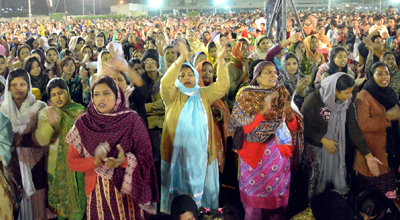Pakistan’s Pentecost
Pakistan isn’t exactly known as a hub for megachurches. Yet a $3.8 million, three-story church that seats 5,000 people has emerged in Azam Basti, a poor suburb of Karachi.
“There were so many people here it was not possible for us to accommodate them on Sundays,” Father Saleh Diego of St. Peter’s of Karachi told the Associated Press. “Now we can pray together, all 5,000 people, worship the Lord and really share and strengthen our faith.”
This Catholic congregation will need strong faith to worship in a Muslim-dominated country that is especially hostile toward Christians. Pakistan’s Christians make up about 2.5 percent in a country of 176.7 million, according to Open Doors’ latest data. Yet Pakistan ranks 10th on Open Doors’ 2012 World Watch List of the worst persecutors of Christians.
Death threats are routine for church leaders, beatings are common and damage to church property is a monthly reality in Pakistan. But it seems the Holy Spirit has set apart Azam Basti as a safe haven for believers, if there is such a thing in Pakistan. The Karachi suburb, home to about 15,000, is a community with more than 500 Christian families, dozens of churches and a minority of peace-loving Muslims.
“Extremism is relevant in Pakistan, but that doesn’t mean there’s no hope,” says Samuel George, senior pastor of the Philadelphia Pentecostal Church in Azam Basti. “People are getting desperate in Pakistan. They can see the absence of God’s blessings in our society. They are beginning to ask what the nation is doing wrong—and they are getting hungry for the true God.”
George believes the Holy Spirit will satisfy that hunger, despite a growing population of militant Muslims. Pakistan, which is 96 percent Muslim, has the second largest Muslim population after Indonesia, and according to a Pew Research report it is set to surpass Indonesia by 2030. That could give rise to even greater Christian persecution, but the Holy Spirit is preparing churches to receive Muslims looking for the true God.
“There are churches that have been built here recently that can house 2,000 or 3,000 people,” George says. “There are also small churches and cell groups. That is our model in Karachi. My father started in 1963 with small prayer groups throughout the city and those prayer groups grew into small congregations and those small congregations became big churches.”
George says Philadelphia Pentecostal Church has 42 pastors and evangelists in Karachi, believed to be the largest Muslim city in the world, and almost 50 in the more dangerous Punjab area. The church also has a Bible college that will soon graduate more pastors who will start churches across Pakistan.
While George realizes that some Spirit-filled believers will be falsely accused of blasphemy against the Islamic Prophet Muhammad for sharing their faith, others are concerned far worse persecution lies ahead.
“As a Pakistani Christian, defending your faith puts you at risk of being shot like a dog,” says Todd Nettleton, a Voice of the Martyrs spokesperson. “This is not a positive marker for religious freedom. Since the death of Osama bin Laden, we’re seeing more Christians in Pakistan attacked because the United States is perceived as a Christian country, and they are taking out their anger on the Christians who live there.”
Pakistani laws allow Christians to run churches, and Open Doors reports that the Christian population there is growing as a steady but significant trickle of Muslims convert. But the only real hope of widespread change in Pakistan is the rapid propagation of the gospel and an outpouring of the Holy Spirit.
The good news is that God is moving in Azam Basti and throughout the nation. A recent Marilyn Hickey healing crusade drew more than 200,000 people on one night in Karachi, where the 80-year-old evangelist has built bridges for more than 16 years. High-level government officials, including the prime minister’s senior advisor, publicly supported the meetings, while a governor invited Hickey to his home to pray for his family.
Pakistani Christians are refusing to shrink back in the face of torture or even death. George, for one, doesn’t deny the threat of persecution—a radical Muslim school just opened up on the same street as his church. But he also sees God’s hand over Pakistan and knows the Lord is answering prayers for provision and protection, while raising up the next generation of preachers in the country.
“There are quite a few former Muslims in Pakistan who feel called to share Christ in sensitive areas—and they are seeing tremendous results,” says Gary Lane, senior international correspondent and international news director for the Christian Broadcasting Network.
“Their lives have been on the line—some have actually been kidnapped by Taliban types and tortured. … But I’ve seen Christian outreaches after earthquakes where imams came to Christ and wanted to be baptized. Philippians 1:29 says it’s not enough just to believe in Christ but also to suffer for Him. It’s still very difficult to be a Christian in Pakistan.”














































